
A Maryland man, Adam Michael Nettina, has been sentenced to two years in prison and three years of supervised release for issuing death threats and promoting violence against an LGBTQI+ advocacy group. The sentencing underscores the commitment of the Justice Department to combat threats against public officials and protected communities.
Nettina’s threats extended beyond the advocacy group, targeting Maryland and Virginia state delegates who supported transgender rights. Assistant Attorney General Kristen Clarke emphasized the severity of the situation, stating that such actions instill fear and promote violence against an already heavily targeted community.
U.S. Attorney Erek L. Barron reinforced the message that free speech does not include violent threats, emphasizing that the Justice Department will prosecute such threats to the fullest extent of the law. Acting Special Agent in Charge R. Joseph Rothrock of the FBI Baltimore Field Office echoed this sentiment, vowing to protect the civil rights of all Americans.
According to court documents, Nettina left a threatening voicemail for the advocacy organization, referencing a tragic mass shooting in Nashville and making explicit threats. He intentionally selected the organization as a target based on the gender, gender identity, and sexual orientation of its members.
Nettina’s threats also extended to state delegates who publicly supported transgender rights. He utilized social media and email to harass and intimidate them, demonstrating a pattern of targeting individuals based on their perceived or actual gender, gender identity, and sexual orientation.
The case highlights the growing concern of bias-motivated acts of violence directed at the LGBTQI+ community and their allies. The Justice Department’s commitment to combating such threats is evident in the prosecution of individuals like Nettina, sending a clear message that violence and intimidation will not be tolerated.
As society strives for inclusivity and acceptance, cases like this serve as a reminder of the challenges faced by the LGBTQI+ community. The legal system’s response signals a commitment to protecting the rights and safety of individuals targeted because of their identity.